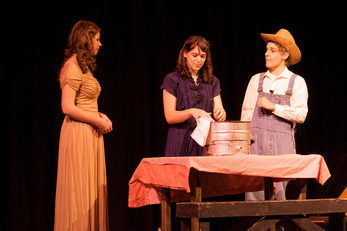Dialog Role-Play for Communication Practice
by Lucille Lever
A dramatic presentation of a prepared dialog involves challenge, joy, fun and a
great speaking practice platform. Role-plays are useful for the emotional and
social self.
Plays, in general, are a wonderful means for role-play, characterization,
improvisation and performing aloud. The dialog, in particular, is an excellent
introduction to sharing a script by allowing students to work in pairs, deal
with only one other, and have equal ability to express opinion, and have an
active part in the performance.
Dialog Scripts
The use of dialog scripts in a drama class, language lesson, foreign language
lesson, or communication groups enables communicative pair-work, creates
a platform for reading aloud practice, teaches turn-taking and pacing, enhances
dramatic characterization, adds discussion and fun to any lesson, results
in a memorable performance.
Supplying a role-play dialog based on a topic or grammar point allows students to use
language more fluently and realistically than reading regular grammar sentences
from a text book. Students can also write the dialogs (in pairs) in a language
lesson, using given sets of vocabulary or grammar structure. Part of the
practice is the preparation it takes to act out in the class.
Role-play preparation means that students are focused on material and deal with it from
many sides, such as reading, discussion, speaking, rehearsing and presentation.
Usual text work can be tedious when repeated many times, but having pairs act
out a scene again and again becomes entertaining, specifically because of its
repetition.
Abstract Role-Play Dialogs
Abstract dialogs are even more intriguing. Abstract dialogs are those in which the words
don’t quite make sense as they stand, and the students have to discuss and
analyze what is silently going on between the lines. Teachers should encourage
students to understand the words in the text, and try to determine the
underlying reactions between the words in order to perform the abstract dialog.
Results will be intriguing as the performers will show a variety of acts based
on any one given script. This kind of dialog can only be given to students whom
the teacher feels are mature enough to understand both the text and the
underlying possibilities. From middle school-aged ESL students, through adult
ESL learners, this kind of simplified text can be easy to work with, yet allow
for more depth from the underlying story behind the scene.
Example of an Abstract Dialog
A:
Did you bring it?
B:
Why did you expect me to?
A:
I told you yesterday that we need it.
B:
I’ll get one later. Did you bring the stone?
A:
No!
B:
Well that was stupid! How are we going to do it without a
stone?
Preparation by the students:
Who are the speakers, what are their ages, what are their names? - Where is this conversation taking place?
What are they talking about?
What is the “stone”?
What was forgotten?
What happened just before this scene?
What happens after this scene takes place?
Preparing a Dialog Performance
A lot of planning and discussion needs to take place in pairs for students to set
up their act. The words have to make sense. The act has to flow and the
audience has to understand exactly what is going on. From a dramatic point of
view, the action taking place between the lines is just as important as the
words themselves. The performance can also be enhanced with costumes
that the teachers can help create. This activity promotes discussion, agreement,
disagreement, argument, sharing of ideas, practice and presentation. Students in the audience may be challenged
to summarize the content of each of the performances. The text demands their
focus, understanding and an interpretation of what they have
viewed.
A post performance discussion in the class can be encouraged for students to
speak about the different interpretations that they saw, and they can explain
which acts they liked and if they enjoyed learning via the dialogs. This
feedback will encourage teachers to use dialogs again, or help adapt the idea
to make it more successful at another time. Many aspects of language practice
can be incorporated into the lesson via dialog role-plays and success will most
likely result. Teachers can enjoy this easily prepared, creative addition to
communication, drama and language lessons.
What are they talking about?
What is the “stone”?
What was forgotten?
What happened just before this scene?
What happens after this scene takes place?

